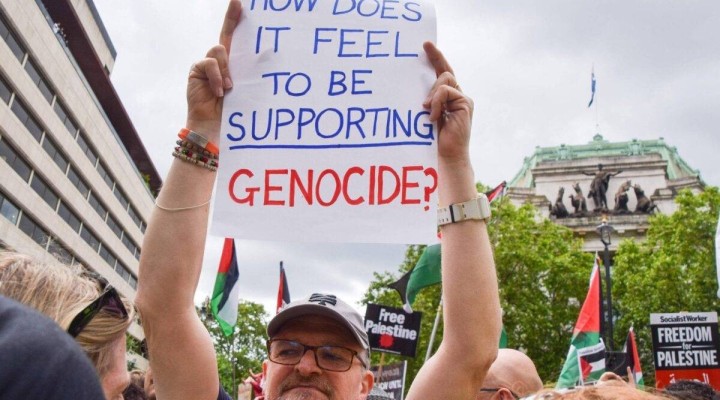Internationalism is needed urgently to stand against the politics of genocide

Western leaders want to stop the repercussions of genocide from hitting non-Palestinians, but stopping Israel from committing genocide against Palestinians in Gaza is not on the political or humanitarian agenda. At the UN General Assembly, Australia will be inviting countries to sign a pledge to protect humanitarian aid workers. The initiative is linked to Israel’s attack on a World Central Kitchen convoy, in which seven aid workers were killed and which caused the international community to react with shock — albeit temporarily — as it realised that Israel kills anyone who stands in its way of emptying Gaza of Palestinians.
“2024 is on track to be the deadliest year on record for aid workers. Australia is deeply concerned by this trend,” said Australian Foreign Minister Penny Wong. “Gaza is the deadliest place on earth to be an aid worker.”
Gaza is also the deadliest place on earth to be a Palestinian, along with the occupied West Bank.
How about a declaration about that? And that the settler-colonial state of Israel is responsible for this awful state of affairs? That would be a start, although genocide would still have not been mentioned.
According to Wong, governments and international institutions should collaborate and come up with “practical steps to safeguard [aid] workers”, through a declaration, of course, not any tangible action to stop Israel’s genocide. The international community is thus willing to sacrifice aid workers in the name of diplomacy and to protect Israel even as it carries out its genocide against the Palestinians. Since mere words in diplomatic declarations don’t provide protection, the Australian government’s tactic is to invoke remembrance of the Israeli strike on the WCK — nothing more — and condemn international aid workers to be collateral damage for Israel’s bombs.
Israel has exposed how genocide can become permissible and normalised, and is exporting the same tactics it has used against Palestinians to Lebanon under the guise of getting rid of Hezbollah. Western leaders, meanwhile, as Wong clearly articulated, are purportedly concerned with how their failed diplomacy can still maintain the illusion of relevance while allowing Israel to destroy international laws and conventions. The underlying message from Western leaders is that genocide can and must continue, and the West will work to accommodate genocide, picking and choosing what to discuss and prioritise, and even making a mockery out of its humanitarian agenda.
At one time, according to Yvette Zegenhagen, the executive director of the external engagement of the Australian Red Cross, wearing the organisation’s symbol was enough protection for aid workers, “Yet we are seeing more and more that it’s not enough to keep them safe.” What is a symbol next to a weapon, and what is a symbol next to genocide?
Wong and other Western leaders will continue to reject any calls to end the genocide in Gaza and its spillover into Lebanon, which creates a new political focus point for the international community. This allows Israel even more freedom to massacre Palestinians in plain view, yet out of sight.
What practical safe steps will Western diplomats conjure up to “protect” aid workers from a genocide that is killing Palestinians and those who try their best to offer some temporary relief?
Genocide is permanent until it is stopped.
Israel knows that nothing will stand in its way, so anything Wong or her counterparts propose will end up as simply words on paper which, like symbols, offer no protection whatsoever. Aid workers, like Palestinians, will continue to be killed. There has never been a greater or more urgent need for internationalism to stand against the current brand of politics that normalises genocide.
https://www.middleeastmonitor.com/20240924-internationalism-is-needed-urgently-to-stand-against-the-politics-of-genocide/
 TheAltWorld
TheAltWorld 
0 thoughts on “Internationalism is needed urgently to stand against the politics of genocide”